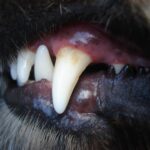February is Dental Health Month

As a dental nurse I know how important it is to maintain a healthy mouth. Dental health for your pets is just as important as it can prevent dental disease which can lead to pain for your pooch.
A study by RVC in 2021 revealed 1 in every 8 dogs (12.5%) overall suffers from dental disease every year.
When your dog eats food, their saliva, bacteria and food form together to form plaque which leaves a film on the teeth, if this isn’t removed it becomes hardened and presses on their gums the build up will lead to inflammation, inflamed gums will come away from the teeth and cause pockets which can trap bacteria and food particles
Dogs teeth will start to bleed as it is trying to flush the bacteria out, their breath will start to smell, the root of the tooth may become exposed leading to sensitivity, if left the bacteria will eat away at the bone causing loose teeth
Dental disease can be painful, but most animals are extremely good at covering up the signs and will rarely stop eating.
Signs to look out for:
- Difficulty picking up food
- Bleeding, puffy or red gums
- Loose teeth
- Blood in saliva, water bowl or on toys and dog chews
- Pawing at mouth/face
- Dribbling
The best way to maintain good oral hygiene is to brush your dogs teeth everyday, Desensitisation is key! Introduce the process of tooth brushing slowly to your cat or dog and always make it as positive an experience as possible.
But there are also others ways to clean your dogs teeth:
Gnawing on dog chews is a natural way for dogs to clean their teeth. The constant chewing scrapes plaque from their teeth. – We suggest treats like olive wood or root chews, pizzles, buffalo or Pig ears, Ostrich bones and trachea Fish cubes are also great as they have a crunchy, rough texture

Natural products such as dental powders and oral care water additives have been proven to reduce plaque and bad breath and are very easy and cost effective to add into your daily routine.